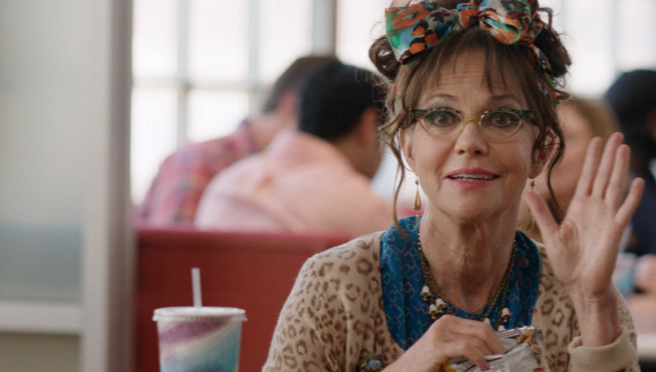These days, it’s a challenge to sell people on Sally Field. She’s been less and less of a staple ever since playing hard-ass Miranda Hillard in Mrs. Doubtfire, but repackaged as a younger man-seeking, Staten Island-dwelling queen of kitsch by Stella co-creator Michael Showalter, she is born again. Co-written with Laura Terruso (who conceived the original short version of the film at NYU, where Showalter teaches), the perfect balance between the most well-known, for lack of a better term, gerontophiliac movies, The Graduate and Harold & Maude, is struck as Doris is compelled to pursue her new art director co-worker, John Fremont (Max Greenfield, a near specimen save for his height).
Doris’ first encounter with John is rife with sexual tension, though it’s difficult to know if John really feels that way as he presses up against her in the crowded elevator in their office near West 23rd Street. “What are those, cat-eye?” he asks as he pushes them back up near her eyes from the middle of her nose. Unaccustomed to being touched in such a way, she’s practically paralyzed as she nods her head in affirmation to the question. As soon as the elevator empties out, however, John goes about his business standing a respectful amount of space away from her.
Doris, apparently a “relic” from the days before the company was bought out and she was kept on for political reasons, interacts very minimally with her fellow employees, and seems naturally out of place as her boss, Anne (Rebecca Wisocky), has everyone’s chairs replaced with exercise balls, a shift that prompts Doris to remark, “But I like my chair. It has a back.” This is just one of the many overt instances of Doris being made to feel anachronistic and irrelevant in her work environment—and in general.
Her best friend, Roz (Tyne Daly), is the sole person in her life who supports her, while everyone else, including her own brother, Todd (Stephen Root), and sister-in-law, Cynthia (Wendi McLendon-Covey), constantly harass her about her hoarding, seizing the opportunity to suggest she see a therapist and sell the house when their mother dies. Doris does her best to ignore their pleas about how useful the money from the sale would be, but obliges them by agreeing to see Dr. Edwards (Elizabeth Reaser), a woman who specializes in treating hoarders.
While Roz is always there for her, Doris begins to suspect there’s more to life than free classes at the YWCA when they attend one put on by Willy Williams (Peter Gallagher), whose entire catch phrase is turning the word “Impossible” into “I’m possible.” This is the mantra he repeats to Doris when she tells him she’s interested in someone who seems out of her reach. But with Willy’s positive assurance, Doris proceeds to make strides toward ingratiating herself into John’s life by deflating her exercise ball and having him pump it back up again and creating a fake Facebook profile with the help of Roz’s granddaughter, Vivian (Isabella Acres). Part of her stalking research unearths that John’s favorite band is Baby Goya and the Nuclear Winters, a sort of parody of the average prog-rock indie band with fun’s lead singer, Jack Antonoff, in the role of Baby Goya. Googling “girl with a master’s degree” to set up a false identity under the name Lillith Primrose (a character name Doris always envisioned for herself if she were a character in a romance novel—that, and Lillith Cumswell), Doris is allowed unfettered access into the mind and whereabouts of John. And, after John sees the Baby Goya CD—yes, CD—on her desk, it’s not creepy or improbable to him to see her show up to his concert in Williamsburg dressed in a neon yellow jumpsuit. In fact, so entranced is everyone by her aesthetic, it’s almost as though she transcends into a millennial satyr. Even Baby Goya himself summons her backstage to offer her the opportunity to be the model for his next album cover. All of this, of course, only serves to improve her cachet in the eyes of John—or so she thinks until she sees him meet up with his girlfriend after work one day, vomiticiously named Brooklyn (Beth Behrs). In typical Doris fashion, when Brooklyn explains her name as being a result of her Coloradoan parents loving Woody Allen movies, she responds, “Then why didn’t they name you Woody Allen?”
Driven to drunken, mad jealousy, Doris has the boldness to post on John’s wall as Lillith the sort of old lady Dickinson-esque shit that could just nowadays be mistaken for a pseudo-intellectual Brooklyn dweller’s natural speech (you know, “love torn asunder,” all that). This, of course, throws a rift into the relationship that leads John right to Doris, much to her combined delight and dismay. But Showalter isn’t the type to take it to the dark places where his forebears, Mike Nichols and Hal Ashby, were able to. Its camp is of a Williamsburg nature, after all, and must be kept in a certain check—a boundary that one-ups Girls (even Lena Dunham’s boyfriend, Antonoff, would rather cameo in this), but doesn’t quite surpass Zhe Zhe with the level of macabre it is willing to go beyond. Even so, Sally Field gives hope to women in their sixties everywhere, even though Madonna is already doing that in her late fifties now, just, apparently, not as endearingly because her “out-of-touchness” isn’t deliberate.




















